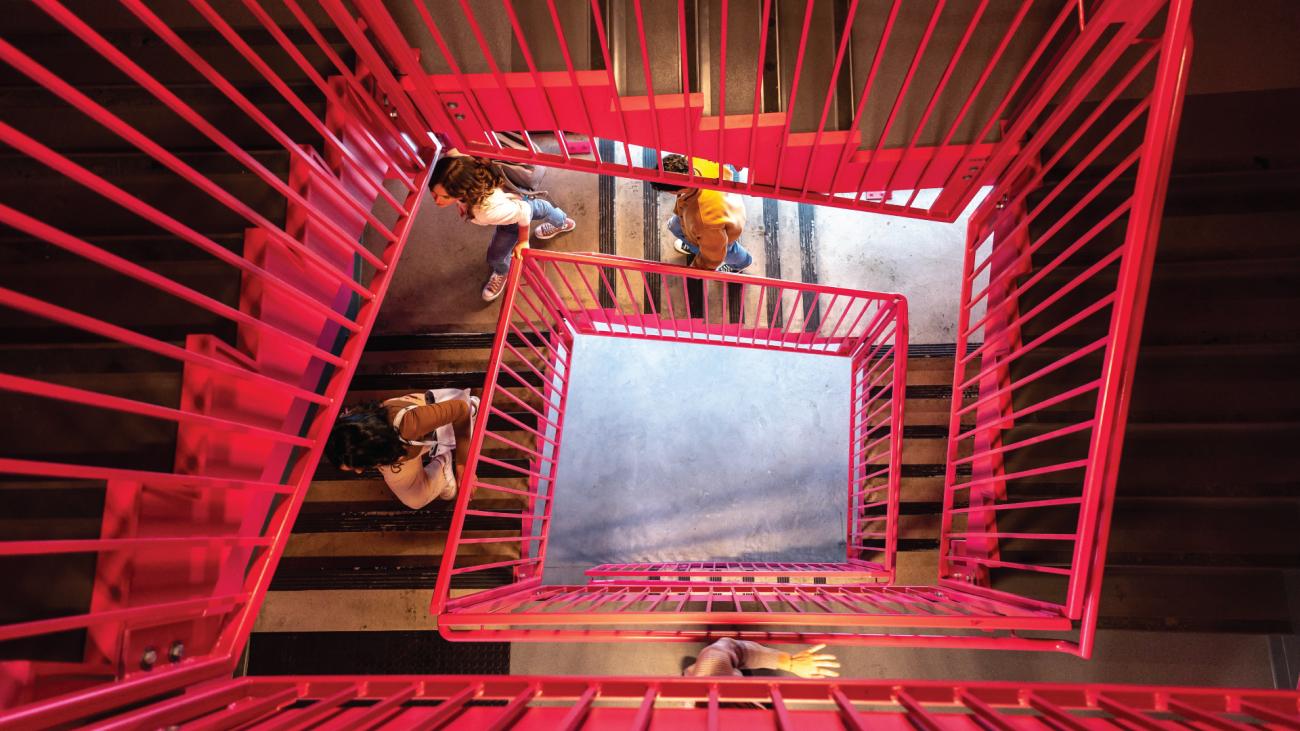Step up physical activity with “exercise snacks” at work
Stairclimbing between meetings can break up sedentary time and boost activity.
Getting up from the desk, taking a walk around the block or using the stairs instead of the elevator can go a long way in helping the health of sedentary workers, according to new research from UBC Okanagan.
A team of UBCO researchers recently published a study looking at the feasibility of short bursts of exercise — known as exercise snacks — performed in the workplace. The paper suggests if exercise snacks became as routine as sitting, virtual or in-person meetings, and water cooler breaks, the workplace could become a healthier environment.
“Sedentary behaviour and physical inactivity are two key factors that have been independently linked to premature morbidity and mortality,” says the study’s lead author, Dr. Matthew Stork (PhD'18). “Moving more throughout the work day may not only improve physical health but also has the potential to positively impact mental health and work productivity.”
But a full day at work, combined with any household duties such as dinner preparation and helping the kids with homework, leaves little time for full-time employees to get 30 minutes of cardio exercise. That’s where the idea of exercise snacks comes in.
Exercise snacks are a modern convention, and previous studies by Dr. Jonathan Little, professor in UBCO’s Faculty of Health and Social Development, have demonstrated that repeated short bouts of this style of exercise can help people get fitter.
This newest research, published recently in the journal Applied Physiology, Nutrition, and Metabolism, says exercise snacks, along with health improvements, could easily and enjoyably be integrated into the workplace, says Dr. Alexis Marcotte-Chénard, who worked on this research as a visiting scholar from the Université de Sherbrooke.
“We know traditionally prescribed moderate-intensity exercise may be impractical for many office employees who are unfit and short on time,” Dr. Marcotte-Chénard says. “The main objective of this study was to determine people’s receptivity to completing exercise snacks in a real-world workplace setting and evaluate a person’s psychological responses to two types of stairclimbing activity.”
The researchers recruited participants at UBC’s Okanagan campus, and the stairclimbing exercise was completed across five different buildings on campus — the participants’ natural working environment. The study compared two options of exercise: high-intensity interval training (HIIT), performed as three bouts of about 60 stairs (three flights) within a structured five- to six-minute HIIT session, and exercise snacks, consisting of three isolated bouts of about 60 stairs performed sporadically throughout the work day.
“We wanted to determine which option the participants found to be more pleasurable, enjoyable, and practical for completion in their natural work environment,” Dr. Marcotte-Chénard says. “Participants tried both options while supervised by the researchers, and then were free to try either option unsupervised in their workplace for one week.”
Results showed that 71 per cent of participants preferred completing exercise snacks, compared to stair-climbing HIIT. There was also a lower perceived rating of exertion during the exercise snacks. Whether they preferred HIIT or exercise snacks, all participants noted high post-exercise enjoyment and self-efficacy towards both types of workplace exercise.
“There has been a lack of research to assess the psychological and affective response to exercise snacks, which is a major gap because these are known to be important predictors of exercise participation,” Dr. Stork adds.
“This study addressed this key knowledge gap by examining the psychological responses to exercise snacks. To our knowledge, this was the first study assessing the acute psychological responses to exercise snacks in a workplace setting. The findings are encouraging because they indicate that exercise snacks, simply climbing three flights of stairs three times per day, might be an attractive way to increase physical activity and fitness in the workplace.”
This new study helps build the foundation for future research on the potential health benefits of exercise snacks in the real world. Drs. Little and Marcotte-Chénard continue the research in the Exercise Metabolism and Inflammation Lab at UBC Okanagan.
































